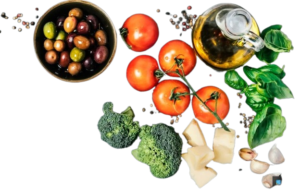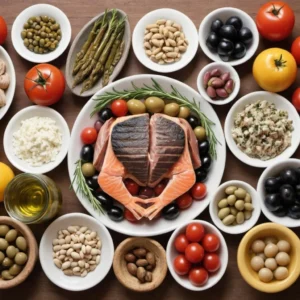The Mediterranean diet is a way of eating that emphasizes the consumption of plant-based foods and incorporates moderate amounts of animal products, focusing on nutrient-dense, whole foods while minimizing ultra-processed items. Rooted in the traditional dietary habits of countries surrounding the Mediterranean Sea, this diet has garnered attention for its numerous health benefits, including heart health, weight management, and reduced risk of chronic diseases.

Plant-Based Foods:
- Fruits and Vegetables: A variety of fresh produce, consumed in generous portions.
- Whole Grains: Foods such as whole grain bread, brown rice, quinoa, and whole wheat pasta.
- Legumes: Beans, lentils, and chickpeas form a significant part of meals.
Healthy Fats:
- Olive Oil: The primary source of fat, used in cooking and dressings.
- Nuts and Seeds: Almonds, walnuts, sunflower seeds, and flaxseeds.
- Fatty Fish: Salmon, mackerel, sardines, and tuna, which are rich in omega-3 fatty acids.
Animal Products:
- Seafood: Consumed regularly in moderate amounts.
- Poultry and Eggs: Included less frequently than plant-based proteins.
- Dairy: Mostly low-fat options like yogurt and cheese, consumed in moderation.
- Red Meat: Eaten sparingly, often limited to a few times per month.
Beverages:
- Water: The primary hydration source.
- Red Wine: Consumed in moderation (optional), typically one glass per day for women and up to two for men.
Herbs and Spices:
- Herbs: Basil, oregano, rosemary, and thyme to enhance flavors.
- Spices: Cumin, coriander, and paprika to add depth to dishes.
Step-By-Step Instructions
- Emphasize Plant-Based Foods: Ensure that most meals feature a variety of vegetables, fruits, legumes, and whole grains.
- Use Healthy Fats: Cook with olive oil and incorporate nuts and seeds into meals and snacks.
- Include Moderate Amounts of Animal Products: Opt for fish and seafood a few times a week, poultry and eggs occasionally, and keep red meat consumption minimal.
- Choose Dairy Wisely: Select low-fat options like Greek yogurt and small amounts of cheese.
- Stay Hydrated: Drink plenty of water throughout the day and enjoy red wine in moderation if desired.
- Enhance Flavors Naturally: Use herbs and spices to season food instead of relying on salt and processed seasonings.
Directions for a Day of Mediterranean Eating
Breakfast:
- Greek yogurt topped with fresh berries, a drizzle of honey, and a sprinkle of chopped nuts.
Lunch:
- Quinoa salad with chickpeas, cucumber, tomatoes, red onion, and a lemon-olive oil dressing.
Dinner:
- Grilled salmon with a side of steamed broccoli and brown rice, drizzled with a bit of extra virgin olive oil and seasoned with herbs.
Snacks:
- Sliced apple with almond butter
- Hummus with carrot and celery sticks
Beverages:
- Water with a slice of lemon or a glass of sparkling water
- One glass of red wine with dinner (optional)
Nutrition Facts
A typical day following the Mediterranean diet may provide the following nutritional benefits:
- High in Fiber: From fruits, vegetables, legumes, and whole grains.
- Rich in Healthy Fats: Mainly from olive oil, nuts, seeds, and fatty fish.
- Moderate Protein: Sourced from legumes, fish, poultry, and low-fat dairy.
- Low in Saturated Fats and Processed Sugars: Limited red meat and avoidance of ultra-processed foods.

Reviews
Many individuals who adopt the Mediterranean diet report significant health improvements, such as increased energy levels, better digestion, and a noticeable impact on weight management. Health professionals often recommend this diet for its well-documented benefits in reducing the risk of heart disease, managing diabetes, and promoting overall longevity.
Community Tips and Praise
- Variety is Key: Experiment with different vegetables, grains, and protein sources to keep meals interesting.
- Cooking Together: Enjoy the social aspect of the Mediterranean lifestyle by preparing meals with family and friends.
- Stay Active: Incorporate regular physical activity into your routine, as it complements the dietary habits of the Mediterranean region.
- Plan Ahead: Keep a well-stocked pantry with staples like olive oil, canned beans, and whole grains to make meal preparation easier.
In conclusion, the Mediterranean diet is not just a diet but a sustainable way of eating that emphasizes whole, nutrient-dense foods and a balanced lifestyle. By focusing on plant-based ingredients, healthy fats, and moderate consumption of animal products, you can enjoy delicious meals while reaping significant health benefits.




